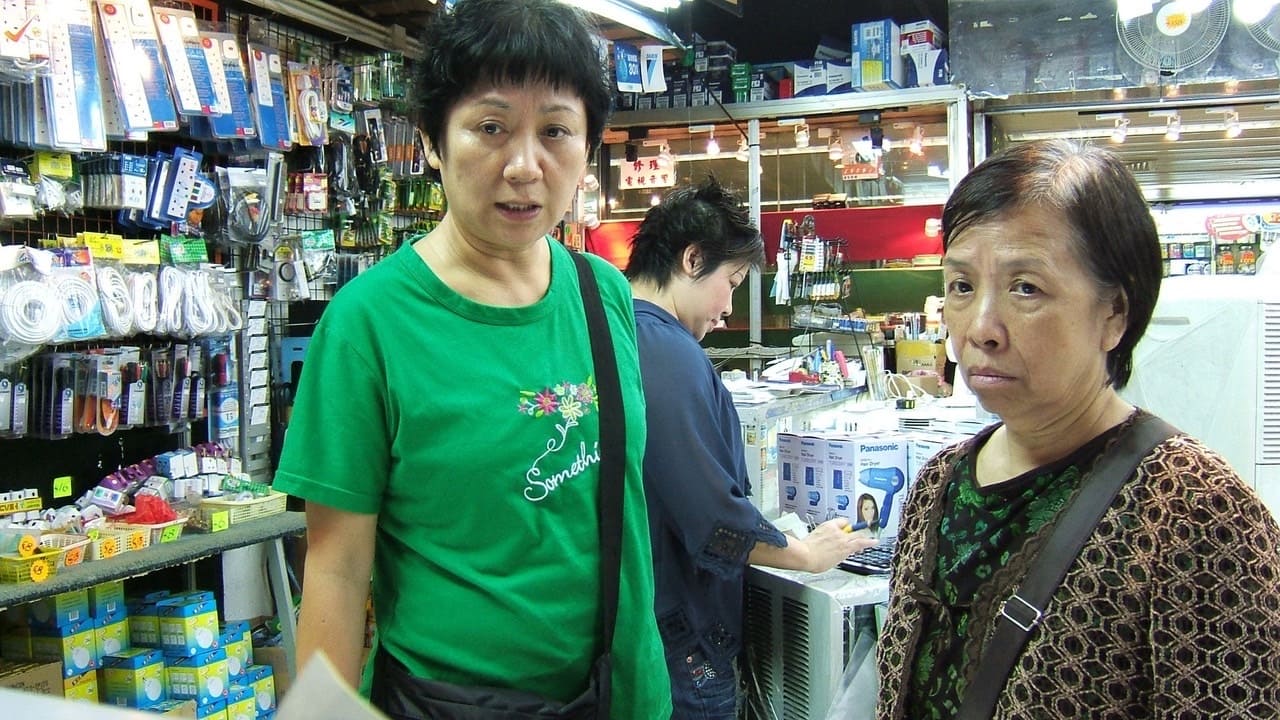Blaironit
Excellent film with a gripping story!
Supelice
Dreadfully Boring
Hadrina
The movie's neither hopeful in contrived ways, nor hopeless in different contrived ways. Somehow it manages to be wonderful
Joanna Mccarty
Amazing worth wacthing. So good. Biased but well made with many good points.
lasttimeisaw
The literal meaning of its original Chinese title is "the day and night of Tin Shui Wai", Tin Shui Wai is a northwestern area of Hong Kong and is noted for its public housing estates, where mostly low-income families inhibit, Ann Hui's heartfelt picture centers on a single mother Mrs. Cheung (Paw) and her teenage son Ka-on (Leung), through their kitchen-sink daily life, it cogently reflects our modern society's interpersonal relations with spontaneous casualness and certainly Hui's best work I've ever watched (I have yet to see A SIMPLE LIFE 2011)! The film runs effortlessly to rotate around Cheung and Ka-on's quotidian doings, Cheung works in a supermarket and Ka-on idles at their boxy apartment since it is summer vacation. Granny Leung Foon (Lai-wan Chan), a new neighbor who lost her daughter recently and her son-in-law remarried, Leung Foon's solitary life is singled out naturally through her entry scenes (buy a paltry portion of beef for herself, the meat vendor even fastidiously complains one of her coins is black and demands a swap), records more closely to her meals (the same beef fried with cabbage being consumed in both lunch and dinner), the artistry is all in the details. Leung Foon is typically protective and penny-pinching, but her heart will gradually open to Cheung and Ka- on, since a near neighbor is better than a distant cousin, among them, a sensitive surrogate family bond is developing and culminating after a tearjerking talking heart to heart on a bus back from a fruitless attempt to visit Foon's grandson. Meanwhile, the backstory of Cheung and the tacit alienation between Cheung and her mother, her well-off brothers are all steadily unraveling, Cheung is a woman full of pride, she can undertake hardships, she never solicit any remuneration for bringing up two brothers, but her mother thinks it is her tomfoolery to struggle in poverty, this creates a knot between them, but family is always family, there is no grudges among them, Cheung's swallow nest congee betokens that tellingly. Hee Ching Paw and Lai-wan Chan are pitch perfect in their lifelike performances (which incredibly counters their theatrical training), newcomer Chun-lung Leung is also a force of nature, here is a young boy without any rebellious traits (no gamble, no girlfriend problem, no drug abuse, no religious hindrance), his upbringing is the most laudable feat and yet Hui achieves that by no hyperbole at all. If you are a Hong Kong cinema connoisseur, you will be thrilled to see a cameo from a comely Idy Chan (15 years after her retirement from the screen).Ann Hui is a tower of strength in current HK cinema scenery, she is less internationally- recognized than Johnny To, but her cannon is so rich and diverse and her unique mastery of humanistic care should enlist her name among the most overlooked directors of all time!
ngancil
If you want to watch movies about special effects, explosives here & there or whatever, go rent Ironman or Transformers, this is Ann Hui's The Way We Are, some of you may complain of boredom, with the lack of pace in the story flow, I didn't, I wept.What amazes me the most is it's simplicity, their daily lives, activities, family problems, those things that you might encounter everyday, & how to cherish them. You don't need to be an alien to become interested in this movie, if you feel bored, then this movie is definitely not for you.I praise Ann's bravery in doing a film about our problems in life, especially in families, & she made me realize there is so much things in life than just fancy, branded goods & not to become enslaved by them.
mewantmoney2004
My vote might be deceiving because this movie is pretty boring unless you actually watch the whole movie you will probably get bore after the first 20 minutes no wait after 10 minutes. However after watching it with tear flowing out of your eye because you're bore to death will you started to like the main character. The strong point of this movie is about characterization, making you feel for the main character and with it show you the good side of humanity. Even though this isn't base on real life story after you watch the movie it will feel like one which is another strong point. While I was watching it I was pretty much bore to death so I can tell why some people give this movie a 1 but if you actually finish it you will enjoy it like I did. In a sense this is like Twilight saga, in which only some people like it while other cry from how worthless it is(my description), The Way We Are will make some people feel emotional about it while other will just turn it off after 10 or so minutes. So if you really want a good movie base on characterization enjoy this one but if you want something surprising or out of place then don't bother with this one. It is just too simple for it to be anything....except a slice of life :).
seanmok
Ann Hui, an internationally acclaimed Hong Kong director, is perhaps the closer soulmate to Mike Leigh in world cinema today. "The Way We Are" tells the story of a hardworking, good-hearted widow (Mrs. Cheung) who is living with his teenage son (Ka-on) in a housing estate in Tinshuiwai, a suburb regularly featured in the news for all the wrong reasons - family suicide packs, problem teens abusing drugs and massive unemployment.At the start we see the two circling around in a tiny apartment with little communication, each trapped in their own worlds. Cheung works in the fruit counter in a supermarket, while Ka-on spends his summer vacation idling at home waiting for the results of his university entrance exam. Soon we are introduced to Cheung's extended family - then we learn that she spent her young adult life working hard in factories to support her two younger brothers, paid for their education and they've both since moved upward. But before she has her chance, her husband died and left her behind in a poor lower-class suburb.Cheung soon befriends another widow, Granny, who's just moved in the same building. Granny has her grim tale - she was forced to live on her own after her only daughter died and her son-in-law remarried. Her grandson is now what remains of her "family", but he's sadly out of reach. She begins to imprison herself in her "single elderly" flat until Cheung slowly reaches out to her.Then the somber tone of the story takes on an optimistic note. Cheung, ever so nurturing, takes Granny in and they soon bond to form their own support network. We also learn that Ka-on, despite the ear-ring and dyed hair, has inherited the strong, resilient and optimistic personality of his mother, ready and able to take up responsibilities to keep his little family together.The relationship between Cheung and her brothers is also not as remote as it is suggested earlier in the film. While they're no longer as close and the brothers still put their own families before all else, they're here to help Cheung and Ka-on and willing to pay her back by promising to send Ka-on to study overseas if he should fail his exam.At the end Granny's barriers have broken down, implanting herself in her new "family" and treating Ka-on like the grandson that she's no longer able to see ("Even when I die and become a spirit, I will continue to pray for his well being..") and there's still hope for happiness for both women.Ann Hui's direction is bare but her fingerprints are everywhere. There are no comedic distraction to pull us out of the morbid tone of her characters' stories (like she did in "Summer Snow", dealing with the grimmer topics of aging and Alzheimer's disease). We instantly know what is in Cheung's mind (wonderfully plays by veteran TV actress Paw Hee-ching, deservedly named Best Actress in the HK Film Award) with every little gestures - that she's appreciative of having a good son with a hint of a smile, a loving expression that knows how life is still good and a light assuring grab of Granny's hand to pull her up from the dark pit of remorse.While Hui is unique and successful in her own right, I can't help but thinking back to similar characters in Mike Leigh's films - Cheung has the same stubbornness of Poppy in "Happy-Go-Lucky", her relationship with the brothers is akin to the implicit blood-is-thicker-than-water bond Cynthia has with Maurice in "Secrets and Lies" and the overall "plotless" structure of storytelling is very much like "Life is Sweet".And its lesson and massage maybe the same - that although life is hard for Cheung, Granny and Ka-on, it's still sweet and hope is everywhere as long as we still have the will to look for it.

